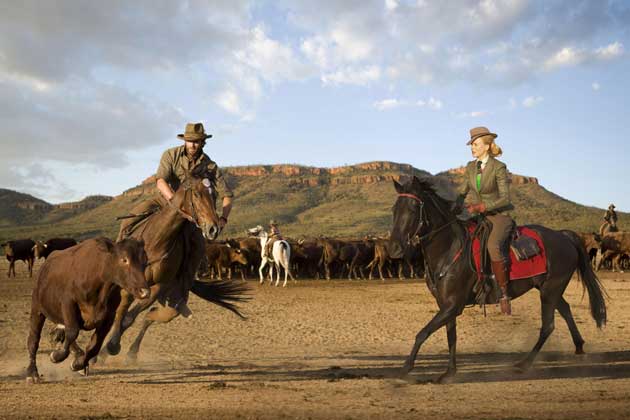Carry on up the billabong: 'Australia' is not quite bonzer
Yes, 'Australia' is ludicrously overblown, but it's watchable – and the scenery's terrific

Your support helps us to tell the story
From reproductive rights to climate change to Big Tech, The Independent is on the ground when the story is developing. Whether it's investigating the financials of Elon Musk's pro-Trump PAC or producing our latest documentary, 'The A Word', which shines a light on the American women fighting for reproductive rights, we know how important it is to parse out the facts from the messaging.
At such a critical moment in US history, we need reporters on the ground. Your donation allows us to keep sending journalists to speak to both sides of the story.
The Independent is trusted by Americans across the entire political spectrum. And unlike many other quality news outlets, we choose not to lock Americans out of our reporting and analysis with paywalls. We believe quality journalism should be available to everyone, paid for by those who can afford it.
Your support makes all the difference.You might say Boxing Day was a fitting release date for the new Nicole Kidman vehicle, Australia – and not just because of the panto quality of Baz Luhrmann's overblown epic. The film arrives in Britain with a reputation as a seasonal turkey – keenly awaited before its premiere, now looking a bit stale. Reactions from Australian critics have ranged from disappointed to scathing. Germaine Greer has attacked it as "a fraudulent and misleading fantasy", whitewashing the realities of the Australian cattle industry and of relations between whites and oppressed Aboriginals.
Since it opened in late November, the film, costing $130m (£89m), has so far made a disappointing $57m (£39m) worldwide. But Australia is not entirely a catastrophe. It's not a terrible film, just a bloated and rather preposterous one – exactly the kind of kitsch mish-mash you'd expect from Luhrmann, who since his 1992 debut Strictly Ballroom, has cheerfully traded on his reputation as cinema's most exuberant vulgarian.
Australia alludes to historical reality – notably the 1942 Japanese bombing of Darwin, and the "stolen generations" of Aboriginal children forcibly removed from their families. But all this is little more than background colour for a confection that is one part Western, one part war story, one part romantic weepie and several parts Carry On Up the Billabong.
Kidman plays Lady Sarah Ashley, an uptight English aristo who finds herself running a remote cattle station in the Northern Territory. Riding to her rescue is a rugged cattleman known only as the Drover (Hugh Jackman), who helps Sarah drive a herd to Darwin in an attempt to beat a ruthless cattle baron (Bryan Brown). Also involved is a young half-Aboriginal boy, Nullah, played by Brandon Walters, whose candid presence provides one of the film's few genuine signs of life.
Once Sarah gets to Darwin, Australia shifts into a full-blown romance. Then the film veers off in another direction entirely, as the Drover attempts to rescue Nullah from an island orphanage and the Japanese bombs.
While Luhrmann is no slouch at whipping up blustery grandeur, his attempt at an old-school epic lacks conviction. As for the film's take on Aboriginal culture, it means well, yet still manages to sideline and sentimentalise its Aboriginal characters.
Australia has its watchable moments: the cliff-edge cattle stampede is as breathtaking a "how-did-they-do-that?" moment as you could wish for. But the romance is tepid and formulaic. The love match – stuck-up schoolmarm falls for roistering rough diamond – emulates such chalk-and-cheese screen couples as Deborah Kerr and Robert Mitchum. But there's no frisson between Kidman and Jackman, both actors too wrapped up in their own narcissism. The film's only real surprise is just how bad Kidman is, especially in the first hour, where her cartoonish Pommie neurotic is stridently grating.
Australia is at once naive and cynical, coy and crass, besotted with nature yet 100 per cent artificial. But it's never boring, the scenery's handsome, and, as long as you don't expect narrative sophistication, there are less lively ways to spend two hours and 45 minutes. Not quite bonzer, but more palatable than the proverbial raw prawn.
Join our commenting forum
Join thought-provoking conversations, follow other Independent readers and see their replies
Comments